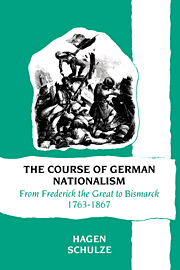Book contents
- Frontmatter
- Contents
- List of maps
- Chronological table
- Map 1 The German Confederation, 1815
- Map 2 The German Customs Union, 1834
- Introduction
- I Three weeks in March
- II The German nationalist movement's road to the creation of the Reich
- 2 The background: Europe's transformation from an agrarian society to a modern civilisation of the masses
- 3 The rise of a national culture
- 4 What has become of the German Fatherland?
- 5 The nationalist movement's passage from an elitist to a mass phenomenon
- 6 From Rhine Crisis to revolution
- 7 1848: the whole of Germany it shall be
- 8 On the road to a national economy
- 9 Speeches and majority decisions
- 10 Blood and Iron
- 11 Revolution from above and below
- III Documentary appendix
- Notes
- Bibliography and source material
- Notes to bibliography
- A critical bibliography of works in English
- Index
5 - The nationalist movement's passage from an elitist to a mass phenomenon
Published online by Cambridge University Press: 06 January 2010
- Frontmatter
- Contents
- List of maps
- Chronological table
- Map 1 The German Confederation, 1815
- Map 2 The German Customs Union, 1834
- Introduction
- I Three weeks in March
- II The German nationalist movement's road to the creation of the Reich
- 2 The background: Europe's transformation from an agrarian society to a modern civilisation of the masses
- 3 The rise of a national culture
- 4 What has become of the German Fatherland?
- 5 The nationalist movement's passage from an elitist to a mass phenomenon
- 6 From Rhine Crisis to revolution
- 7 1848: the whole of Germany it shall be
- 8 On the road to a national economy
- 9 Speeches and majority decisions
- 10 Blood and Iron
- 11 Revolution from above and below
- III Documentary appendix
- Notes
- Bibliography and source material
- Notes to bibliography
- A critical bibliography of works in English
- Index
Summary
The opportunity to bind the loyalty of those classes participating in the political debate to the individual German states was lost in the years following the War of Liberation and the Congress of Vienna. This became apparent immediately after the war. The enormous collective spiritual impetus was followed by disenchantment and the poetry gradually faded. Above all it was the Volunteers, mainly students and artisans, who had been drawn into the war with unprecedented enthusiasm and were driven not only by a considerable need for action, a search for excitement and for a new adventurous existence, but who also attempted to equate their experiences with the words of their songs, words such as ‘God’, ‘Freedom’, ‘Fatherland’, ‘Germany’, ‘Altar’, ‘Dedicated’, ‘Volk’ and ‘Holy’. These songs, sung and composed by them, gave rise to a new forcible and direct language, which summoned up vistas of sworn companionship and harmony, of readiness for sacrifice and a quasi-religious transcendence of the individual into the nation as a whole. The taking of Paris and the final victory over Napoleon at Waterloo marked a sudden end to this intoxication; the young people were supposed to become sensible, to return to their lecture halls, their counters and workshops. They were supposed to trust in the wisdom of the bureaucratic and princely authorities, now conferring in Vienna about how to restore Europe's ancient order, how to talk away the young Germans' dream of the unity and freedom of their Fatherland, and, in the eyes of many, how to betray it. On the economic side too, there were problems.
- Type
- Chapter
- Information
- The Course of German NationalismFrom Frederick the Great to Bismarck 1763–1867, pp. 56 - 63Publisher: Cambridge University PressPrint publication year: 1991



